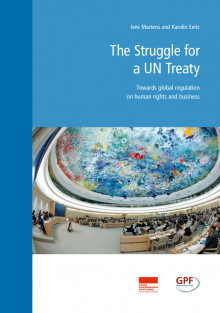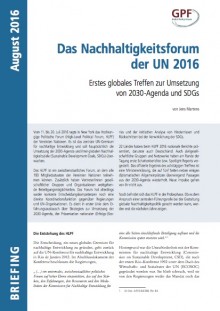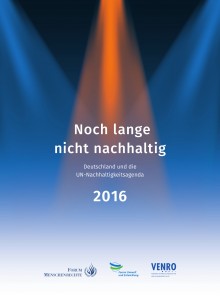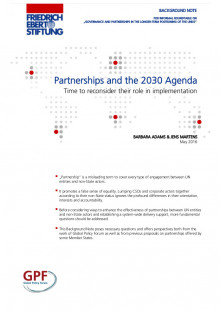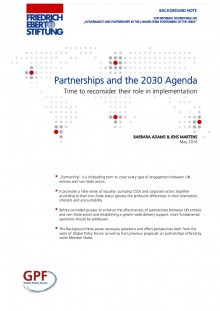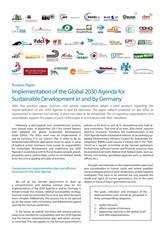Publikationen
Towards global regulation on human rights and business
Erstes globales Treffen zur Umsetzung von 2030-Agenda und SDGs
Vom 11. bis 20. Juli 2016 tagte in New York das Hochrangige Politische Forum (High-Level Political Forum, HLPF) der Vereinten Nationen. Es ist das zentrale UN-Gremium für nachhaltige Entwicklung und soll hauptsächlich die Umsetzung der 2030-Agenda und ihrer globalen Nachhaltigkeitsziele (Sustainable Development Goals, SDGs) überwachen.
Das HLPF ist ein zwischenstaatliches Forum, an dem alle 193 Mitgliedsstaaten der Vereinten Nationen teilnehmen können. Zusätzlich haben Vertreter/innen gesellschaftlicher Gruppen und Organisationen weitgehende Beteiligungsmöglichkeiten. Das Forum hat allerdings weder konkrete Entscheidungskompetenzen noch eine direkte [...]
Report of the Reflection Group on the 2030 Agenda for Sustainable Development
Independent monitoring and review of the implementation of the 2030 Agenda and its structural obstacles and challenges are key factors for the success of the SDGs. It is for this reason, the Reflection Group on the 2030 Agenda for Sustainable Development together with other civil society organizations and networks has produced the first annual Spotlight Reportassessing the implementation of the 2030 Agenda and the structural obstacles in its realization. The report puts a spotlight on the fulfillment of the [...]
Noch lange nicht nachhaltig
Time to reconsider their role in implementation
Time to reconsider their role in implementation
- “Partnership” is a misleading term to cover every type of engagement between UN entities and non-State actors.
- It promotes a false sense of equality. Lumping CSOs and corporate actors together according to their non-State status ignores the profound differences in their orientation, interests and accountability.
- Before considering ways to enhance the effectiveness of partnerships between UN entities and non-State actors and establishing a system-wide delivery support, more fundamental questions should be addressed.
- This Background Note poses necessary questions and offers [...]

